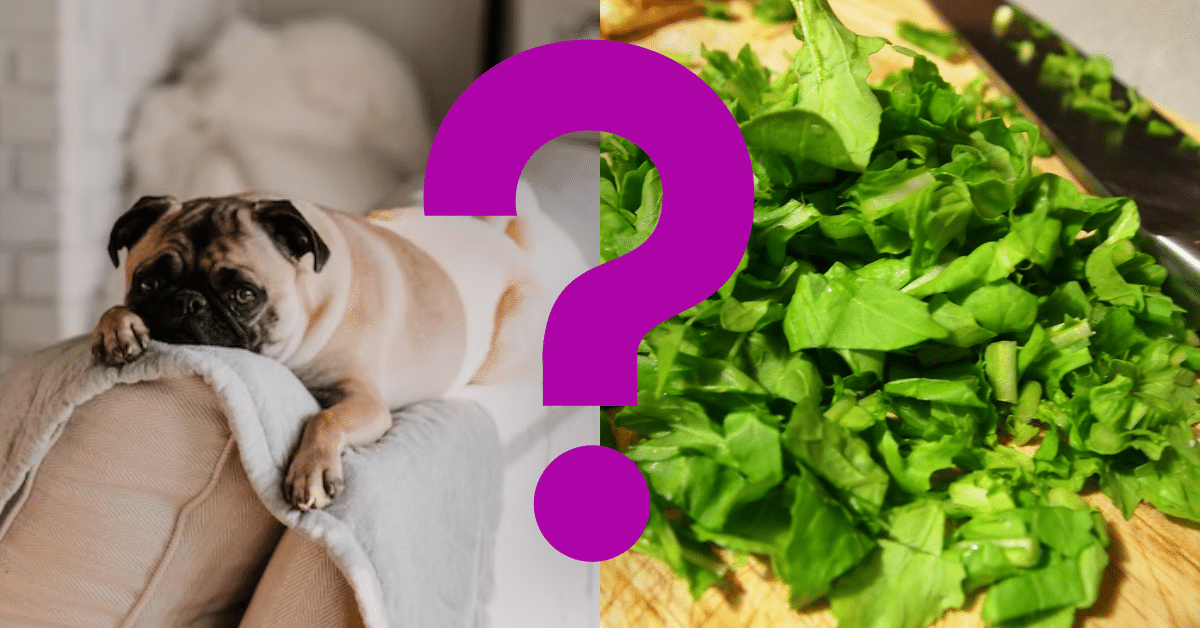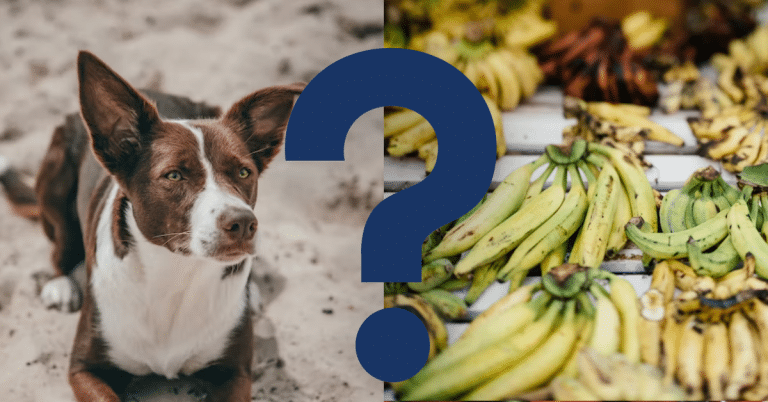Can Dogs Eat Arugula? A Vet’s Opinion

Arugula is a peppery-tasting leafy green vegetable frequently used in salads and as a garnish in different foods, but can you feed an arugula to your dog?
Yes, dogs can consume arugula. Moderate amounts are safe for them to ingest. Arugula is a leafy green vegetable high in vitamins and minerals and low in calories. However, it is critical to introduce new meals gradually and monitor for any adverse reactions. Some dogs may dislike the taste of arugula or develop gastric problems. Before making significant modifications to your dog’s diet, consult a veterinarian.
Benefits Of Arugula For Dogs
When included in a dog’s diet, arugula can provide numerous potential benefits:
Essential Nutrients
Arugula is high in critical vitamins and minerals like vitamins K, C, calcium, and potassium, which can help dogs’ overall health and well-being.
Antioxidants
Arugula contains antioxidants such as beta-carotene and vitamin C, which aid in the fight against free radicals and reduce oxidative stress in the body.
Fiber
Arugula’s fiber content can improve digestion and encourage healthy bowel motions in dogs. It can also help balance blood sugar levels and aid in weight loss.
Hydration
Arugula has a high water content, which can help your dog stay hydrated, especially during the hotter months.
Low-Calorie Content
Arugula is a low-calorie vegetable, making it ideal for dogs on a weight-loss diet or as a nutritious snack without adding extra calories.
Despite these possible benefits, gradually introducing arugula into your dog’s diet is critical to check for unwanted responses. Because each dog is different, it’s essential to contact a veterinarian before introducing new foods to their diet, including arugula.

How To Safely Give Arugula To Dogs
To protect your dog’s safety and well-being, follow these instructions when feeding arugula to them:
Gradually Introduce
Begin by introducing modest amounts of arugula to your dog’s diet to see how they react. Sudden dietary changes might cause stomach distress. Look for side effects like vomiting, diarrhea, or allergic reactions.
Rinse Thoroughly
Before offering arugula to your dog, properly wash it to eliminate any dirt, pesticides, or harmful toxins. Organic arugula is chosen to reduce chemical exposure.
Cut Into Bite-Sized Pieces
Chop the arugula into bite-sized pieces that your dog can eat and absorb. It also helps to reduce choking dangers, which is especially important for little breeds.
Serve Plain
Serve the arugula without any sauces, dressings, or oils. These supplements may contain substances that are harmful to dogs, such as garlic, onions, or an excessive amount of salt. The most incredible option is raw arugula.
Feed In Moderation
While arugula can be a nutritious supplement to your dog’s diet, it should only be eaten in moderation. Too much arugula, or any new meal, can irritate your dog’s stomach or change the balance of their regular diet. Arugula should be considered a supplement rather than a primary food source.
Keep An Eye Out For Allergies
Some dogs are allergic to arugula and other leafy greens. Keep an eye out for symptoms of an allergic reaction, such as itching, redness, swelling, or gastrointestinal problems. Stop feeding arugula to your dog and seek medical attention if you observe any adverse side effects.
Speak With A Veterinarian
Before introducing new food into your dog’s diet, consult your veterinarian. They can give you personalized advice based on your dog’s nutritional demands, health issues, and potential drug interactions or existing diet programs.
Remember that arugula should not be used in place of your dog’s complete and balanced diet. It should be seen as a one-time addition or treat. Prioritize a well-balanced meal that matches your dog’s nutritional needs, and utilize arugula as a supplemental source of vitamins and minerals instead as a primary source of nourishment.
Will Arugula Make A Dog Sick?
While arugula is usually considered healthy for dogs, it may trigger specific unpleasant responses or digestive disorders in individuals. Here are a few potential issues to be aware of:
Upset Stomach: Arugula contains natural chemicals that, particularly in dogs, might cause mild gastrointestinal upset, resulting in symptoms such as diarrhea, vomiting, or flatulence.
Allergies: Dogs, like humans, can acquire allergies to various foods, including arugula. Itching, skin rashes, hives, swelling, and difficulty breathing are all symptoms of allergic responses. If your dog exhibits these symptoms after consuming arugula, stop feeding it and consult a veterinarian.
Oxalate Content: Arugula contains oxalates, which, in large amounts, may contribute to the formation of calcium oxalate stones in some dogs. Arugula should be consumed in moderation or avoided entirely by dogs prone to urinary difficulties or with a history of calcium oxalate stones.
Digestive Issues: Feeding huge chunks of arugula or not correctly slicing it might cause choking or gastrointestinal obstruction, especially in small breed dogs. Before serving arugula to your dog, chop it into appropriate, manageable bits.
Pesticide Exposure: Non-organic arugula may have been pesticide-treated. If your dog consumes pesticide-contaminated arugula, it could have negative health consequences. This risk can be reduced by thoroughly washing arugula or choosing organic types.
It’s crucial to remember that different meals, including arugula, may cause different reactions in different dogs. While many dogs accept arugula without trouble, it’s critical to introduce it gradually, watch their behavior, and stop feeding it if any unpleasant responses arise. A veterinarian should always be consulted to confirm that arugula suits your dog’s health condition, dietary requirements, drug interactions, or existing diet programs.
Can dogs eat arugula variations?
Dogs may eat a variety of arugula varieties, including the several sorts of arugula typically encountered. Here are some arugula varieties that are suitable for dogs to consume:
Wild Arugula: Wild arugula, also known as Diplotaxis tenuifolia, is a more spicy and peppery kind. Dogs can eat it if properly cleansed and provided in moderation.
Baby Arugula: Arugula leaves that are young and fragile are called baby arugula. Baby arugula is safe for dogs but should be fed plain and in small amounts.
Organic Arugula: Organic arugula is an excellent choice for dogs because it decreases pesticide exposure. Even organic arugula should be rinsed before giving it to your dog.
Arugula Microgreens: Arugula microgreens are immature arugula plants plucked when they are only a few inches tall. They are high in nutrients and can be given to dogs in small amounts. Moderation is essential, as with any arugula modification.
Remember to introduce different arugula varieties gradually and monitor your dog’s reaction. It is critical to watch for any unpleasant reactions or digestive troubles. Furthermore, always speak with a veterinarian before introducing new items into your dog’s diet to verify they meet their health and dietary needs.

Vet’s Summary
Arugula can be a healthy and nutritious supplement to a dog’s diet when fed in moderation. It is high in vitamins, minerals, and antioxidants and can help with digestion, hydration, and overall health. However, arugula should be introduced gradually, carefully washed, and served plain without sauces or oils, and any unpleasant reactions or allergies should be monitored. Because of its oxalate level, dogs with a history of urinary difficulties should ingest arugula in moderation. Before introducing new foods to your dog’s diet, consult a veterinarian to confirm they are appropriate for their unique needs.
Recommendation:
In addition to introducing arugula into your dog’s diet, you should provide probiotic pills. Probiotics can benefit your dog’s digestive health by encouraging healthy gut flora. They can help with nutrient absorption, digestion, and immune system strength. Probiotics may be especially beneficial for dogs with sensitive stomachs, frequent digestive problems, or who have been on antibiotics. However, it is critical to speak with your veterinarian to identify the best probiotic supplement for your dog, as the effectiveness of different strains and formulations varies. To ensure that your dog receives the most significant benefit, the veterinarian can select a suitable probiotic and provide instructions on dosage and administration.
Videos To Watch
If you are wondering what related foods are good to give your dog, watch this:
And if you want to know what a dog can NOT eat, watch this:






